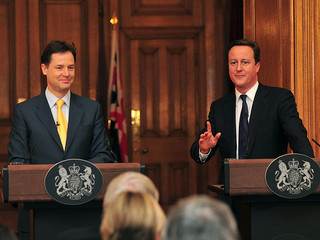 On its own, the fact that the 2010 general election produced a coalition government does not tell us much. But Josh Cowls argues that a repeat experience in 2015, and a second coalition government with a broad and diverse mandate, would herald the end of single-party government in the UK.
On its own, the fact that the 2010 general election produced a coalition government does not tell us much. But Josh Cowls argues that a repeat experience in 2015, and a second coalition government with a broad and diverse mandate, would herald the end of single-party government in the UK.
Consider the following scenario. An indifferent British electorate shrugs its collective shoulders and award Nigel Farage’s UK Independence Party the second highest vote total in this May’s European elections. Buoyed by this win, Farage forces his way onto the stage for the party leader debates in 2015. And in the subsequent general election, for the first time in history, four parties will take more than 10% of the vote nationwide. After trialling an alternative arrangement between 2010 and 2015, the era of single-party government is over.

Traditionally, the British political system has not accommodated third or fourth parties especially well. The majoritarian election system encourages political parties which combine a strong degree of class identification with a broad and more or less coherent policy platform. And historically, when demographic and ideological trends have shifted, the party system has tended to go through a brief period of flux before resettling in its two-party mould: the replacement of the Liberal Party with the Labour Party as the dominant left-of-centre force in British politics in the 1920s was as swift as it was brutal.
But what we see in British politics today isn’t so much realignment as “dealignment”. Rates of party membership have dropped precipitously. The decline of traditional industry and the increasing fetishisation of London’s lucrative Square Mile have complicated traditional party divides. Apathy is on the rise, particularly amongst the young, and who can blame them? If your formative years coincided with Britain’s decade of scandals, 2003-2013, which saw former paragons of society – politicians, policemen, the press, medical professionals, public entertainers and religious leaders – indicted for corruption and fraud, neglect and abuse, then it’s no wonder your faith in the system is at a lower ebb than that of previous generations. British society has been secularised with all the force of a sledgehammer.
It’s hard to imagine, therefore, a full return to the traditional two-party model of majoritarian government. Britons are too diverse and dispersed – and, in the Internet era, too accustomed to a unprecedented freedom of choice in other areas like media and retail – to take seriously the idea that political change can come from choosing Option A or Option B. We are, if you will, entering the era of the Neapolity: a system in which multi-colour coalitions are the norm rather than the exception.
Yet the Neapolitan principle applies not just in the narrow realm of how the government is constituted but also in terms of our political allegiances defined more broadly. Multiple identities per se are nothing new, but in the Neapolitan era, these are something to be cherished and courted rather than brushed under the carpet. Greater racial diversity, improving openness and tolerance around sexual orientation and gender identity, a more fluid labour market (although in a recession ‘fluidity’ of course encompasses zero-hours contracts and unpaid internships alongside more progressive developments) the Internet-enabled rise of single-issue campaigns, and our more differentiated self-definition online all make for a more complex, diverse electorate. Our race, religion, sexual orientation, employment and ideology – in sum, our identity – are less predictable and more differentiated than ever before.
There is, though, a great irony here. This article started with a prediction that the biggest beneficiary of Britain’s great dealignment, at least in the short to medium term, will be Nigel Farage. Quite apart from the fact that this would mean Britain’s four main parties would all be led by white men, Farage would take to the stage as the most inward-looking of the leaders, with restrictive stances on immigration, gay rights and the the EU. Farage is hardly the harbinger of a more modern, mature and nuanced political system.
But this is to confuse the wood for the trees. What matters for the purposes of representative democracy is that there appear to be plenty of people who agree with Farage on those issues and others, and moreover approve of his frankness and freedom in expressing them. He is exposing, therefore, the play-it-safe attitude of the Conservative prime minister David Cameron, who doesn’t seem effective either as a political thermometer nor a thermostat, unable to either take the temperature of public opinion or to adjust it – charges which might also be levelled at Ed Miliband as Labour leader. As Farage is proving, the lifeblood of politics is boiling blood: leaders who are able to capitalise on visceral sentiment often profit at the polls. (Just ask Barack Obama, whose re-election campaign team read the tea leaves and all but abandoned the hopey-changey, post-partisan rhetoric of 2008 in favour of a light-and-shade approach that drew an unflattering caricature of opponent Mitt Romney).
Which is what makes UKIP’s rise, as well as stronger left-of-centre forthrightness from Nick Clegg, all the more interesting. The upcoming debates between the two on the EU will, regardless of their outcomes, draw a distinction that will serve both men well, in contrast to the defensive opaqueness of Cameron and Miliband, neither of whom have such a clear stance on the issue. And with Scottish independence on the agenda too, it wouldn’t be surprising to see these issues-based debates coming into fashion. In a four-party system, it’s no longer just about the economy, stupid: more choice means more granular differentiation on many more issues. Perhaps even the weekly Prime Minister’s Questions sessions will become more substantive and less Punch-and-Judy.
Of course, if multi-party, Neapolitan-style government is to work, staunch disagreement during an election needs to translate into stability in government. Campaigns fought poetically must elect administrations to govern prosaically. But the experience since 2010 has suggested this is at least possible: with the stability of fixed term parliaments and the clarity of a coalition agreement, governing parties (and more importantly civil servants) have a timetable and a road-map to work from. And future coalitions would do well to remember that it is not merely difference in opinion but strength in opinion which characterises party support, as the university fee raise taught Liberal Democrats and as right-wing euroscepticism continues to remind the Conservatives. Cast-iron promises will be harder to come by; manifestoes in 2015 will be less about red pens and more about yellow highlighters, in anticipation of coalition negotiations.
If some of this seems far-sighted at best and far-fetched at worst, I’d argue that that’s only because the British political system has previously been so slow to account for the changes occurring in society. Yet as the arrival of coalition government showed, change can happen quickly in a country missing a codified constitution. By itself, 2010 doesn’t prove too much, taking place as it did in a state of economic emergency. But a repeat experience in 2015, with multiple parties campaigning on myriad issues leading to a coalition government with a broad and diverse mandate, would freeze a nascent Neapolitan system in place.
Note: This article gives the views of the author, and not the position of the British Politics and Policy blog, nor of the London School of Economics. Please read our comments policy before posting.
About the Author
 Josh Cowls is a Research Assistant at the Oxford Internet Institute, working to increase understanding of the promises and pitfalls of big data for social science research. Josh’s background is in researching political science questions in online contexts and working on political campaigns in the US and UK. He tweets @JoshCowls
Josh Cowls is a Research Assistant at the Oxford Internet Institute, working to increase understanding of the promises and pitfalls of big data for social science research. Josh’s background is in researching political science questions in online contexts and working on political campaigns in the US and UK. He tweets @JoshCowls






Interesting but where does this leaves theories of and practice of political change that require real struggle (moral, actual and ideological)? There is the real danger that in this Neapolitan world those with power and wealth increase their global grip in the absence of the challenge to capitalism that the organised forces of labour posed during most of the 20th century ( with the welfare state being the most notable concession that was wrested as a result of that struggle). And that the Harry Potter generation or Generation Y seek to redress what are issues of real power and control through media that merely reinforce their own powerlessness. And which lead to the fragmentation you capture in this piece.
Politics cannot be the practice of choosing what is good for oneself …it is inevitably about collective practice – the choosing between more or less constrained alternatives that appear to possess plausible answers to those issue that are matters of public policy and require responses beyond the individual’s owns capacity to act. And those chives often require one to deal with very real and conflicting views and outcomes that cannot be resolved via market or social media mechanisms.
No answers per se. but thanks for the piece.